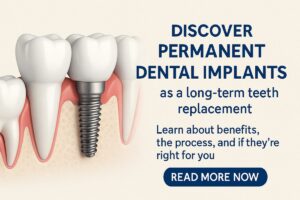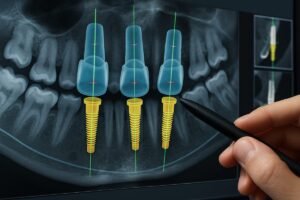Do Dental Implants Stain Like Natural Teeth?
Dental implants are a nearly permanent solution for missing teeth. In many ways, they look and function just like your natural teeth. Patients sometimes ask if implants will also stain like natural teeth.
While implants are typically stain-resistant, this doesn’t mean they’re invincible. Implants may not develop cavities like natural teeth, but they can discolor. To prevent discoloration, it is important to care for your implants just as you care for your natural teeth.
Dental implants are designed to look just like your natural teeth, including matching the color of your teeth. They’re often made with porcelain, which is strong, durable and stain-resistant. As long as the porcelain glaze is maintained properly, your implants will not stain. However, using abrasive toothpastes or acid fluoride will harm the glaze. This leads to discoloration over time.
You may notice that the implant stays bright, but the bonding material holding it in place may change color. If this occurs, we can polish the implants to remove stains and restore its original shine.
Regular dental care goes a long way toward preventing stains on any type of teeth. Your oral health routine should include brushing and flossing twice a day, plus rinsing with a dental approved mouthwash.
Tobacco products contain tar and nicotine which often causes unsightly yellow or brown teeth. Worse yet, using tobacco products can interfere with your implant healing process. If you plan to get implants, it’s wise to stop smoking long before the procedure is scheduled.
Food and drink with heavy concentrations of tannins can also discolor your teeth. Coffee, tea, red wine and berries all contain significant amounts of tannins. Tannins work with acid to corrode your teeth, and may leave behind dark stains. If you’re not ready to give up your morning brew, try to brush your teeth or rinse your mouth with water immediately after consumption.
Abrasive toothpaste can also hasten implant staining. Many toothpastes are too rough for dental implants: they cause tiny micro abrasions which can damage the tooth’s glaze and allow stains to set in. Dr. Mike or your general Fioritto Family dentist can recommend a gentle toothpaste and other oral hygiene products that are safe to use with implants.
Finally, failing to brush your teeth or rinse your mouth after each meal can encourage stains. Even healthy foods can contain acids or chemicals that can damage implants.
Although dental implants can stain, following these tips will help you keep them bright and shiny–and will protect your natural teeth, too!
Are you considering dental implants? When you’re ready to replace missing teeth, Dr. Mike and the staff of Cleveland Implant Institute can help. Schedule a consultation to find out whether you’re a good candidate for dental implants—and how to ensure they remain stain-free once you get them.
Mentor Office
6303 Center St
Mentor, OH 44060-2467
Concord Office
8245 Auburn Road
Concord, OH 44077






